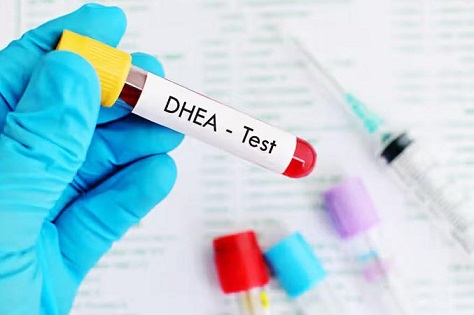Nikhil Prasad Fact checked by:Thailand Medical News Team Jul 19, 2024 9 months, 3 weeks, 2 hours, 25 minutes ago
COVID-19-News: COVID-19, caused by the SARS-CoV-2 virus, has posed unprecedented challenges to global health since its emergence in late 2019. Researchers from various prestigious institutions have conducted a multifaceted investigation into the role of dehydroepiandrosterone sulfate (DHEAS), a steroid hormone produced by the adrenal glands, in understanding the severity and progression of COVID-19. This
COVID-19 News report delves into the study's findings, exploring the intricate relationships between DHEAS levels, disease severity, gender, age, and comorbidities such as hypertension (HT), heart disease (HD), and diabetes mellitus (DM).
 DHEAS levels offer insights into COVID-19 severity
DHEAS levels offer insights into COVID-19 severity
The research team comprises experts from the Immunoregulation Research Center at Shahed University in Iran, the Institute of Biochemistry and Biophysics, Damghan University, Zahedan University of Medical Sciences, Ahvaz Jundishapur University of Medical Sciences, and Mazandaran University of Medical Science. Their collaborative efforts have provided valuable insights that could pave the way for more tailored management of COVID-19 patients.
The Role of DHEAS in COVID-19
DHEAS is known for its crucial role in the immune system. Its levels have been linked to various health outcomes, and this study aimed to unravel its multifaceted role in COVID-19. Researchers quantified DHEAS levels in COVID-19 patients using ELISA and conducted a longitudinal analysis to track its concentration over different days. The study focused on gender-specific trends, the influence of age, and the presence of comorbidities.
Key findings from the study revealed that COVID-19 patients, particularly inpatients, had significantly lower DHEAS levels compared to control groups. However, DHEAS was not strongly associated with mortality or the need for intensive care. Instead, the study unveiled a dynamic pattern of DHEAS levels during COVID-19, marked by an initial decline followed by recovery.
Gender and Age Differences
The study highlighted significant gender-specific trends in DHEAS levels. Females generally exhibited lower DHEAS levels compared to males, both in COVID-19 patients and control groups. Interestingly, this gender disparity was not observed among inpatients admitted to intensive care, suggesting that ICU care may influence DHEAS levels in both males and females.
Furthermore, the study indicated that COVID-19 could accelerate the conventional age-related decline in DHEAS levels among males, hinting at a potential gender-specific effect. The scatter plot analysis suggested a less intense slope in the relationship between DHEAS and age among male patients compared to the control group, underscoring the intricate relationship between age, gender, and COVID-19.
Impact of Comorbidities
Comorbidities such as hypertension, heart disease, and diabetes were prevalent among COVID-19 patients and correlated with disease severity. Hypertension, in particular, appeared to moderate the relationship between hospit
alization and DHEAS levels, especially in females. The study found that HTN-positive COVID-19 patients had significantly lower DHEAS levels compared to HTN-negative patients.
Similarly, patients with underlying heart disease and diabetes also showed lower DHEAS levels. The presence of these comorbidities added another layer of complexity to COVID-19 outcomes, emphasizing the need for a comprehensive approach to managing patients with multiple health conditions.
Dynamic Patterns of DHEAS Levels
The study observed a significant decrease in DHEAS levels during the early stages of COVID-19, followed by a recovery phase. This dynamic pattern was more pronounced in inpatients, who experienced a prolonged decrease in DHEAS levels for up to 14 days. In contrast, outpatients initially exhibited a decline in DHEAS concentration during the first three days, followed by a noticeable and relatively rapid increase that eventually recovered to control levels.
This recovery phase may signify the restoration of hormonal balance as the body recovers from the acute stress response induced by the viral infection. The dynamic nature of DHEAS levels during COVID-19 highlights the complexity of the disease and its impact on hormonal regulation.
Implications for Tailored Management
The study's findings suggest that DHEAS can serve as a biomarker for measuring COVID-19 severity, providing valuable insights into the underlying pathophysiological processes. The significant reduction in DHEAS levels among hospitalized patients and those with comorbidities underscores the hormone's potential role in clinical decision-making and patient management.
Moreover, the gender-specific differences in DHEAS levels highlight the importance of considering demographic factors in disease management. Tailored approaches that take into account age, gender, and the presence of comorbidities could lead to more effective and personalized treatments for COVID-19 patients.
Conclusion
The multifaceted investigation into DHEAS levels in COVID-19 patients provides a deeper understanding of the disease's complexity. The study reveals that DHEAS levels are influenced by various factors, including disease severity, gender, age, and comorbidities. These findings underscore the need for a comprehensive and tailored approach to managing COVID-19, taking into account the intricate interactions between hormonal, demographic, and health-related factors.
The study findings were published on a preprint server and are currently being peer reviewed.
https://www.researchsquare.com/article/rs-4553372/v1
For the latest
COVID-19 News, keep on logging to Thailand Medical News.
Read Also:
https://www.thailandmedical.news/news/bromo-epi-androsterone-bea-for-neurologic-long-covid
https://www.thailandmedical.news/news/stanford-researchers-prove-recombinant-growth-hormone-can-reverse-aging
